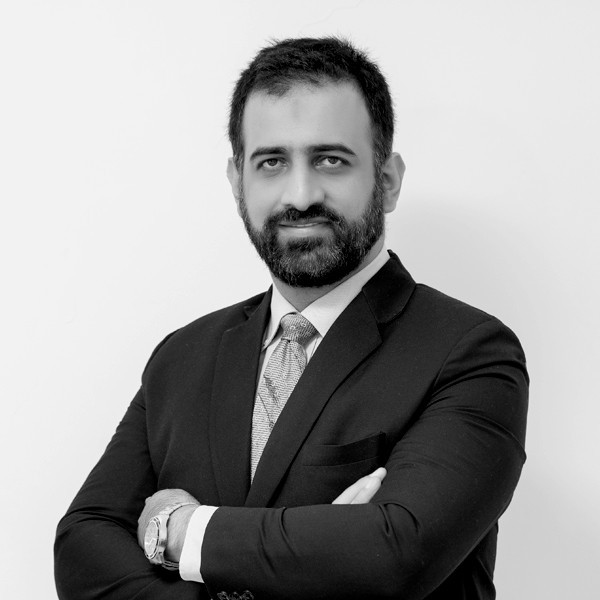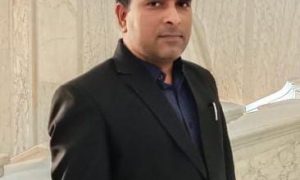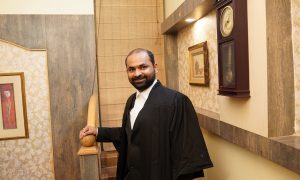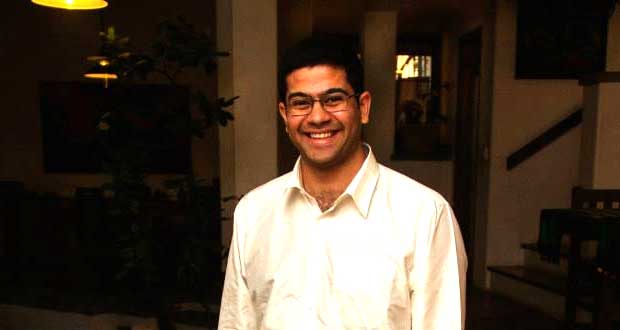This interview has been published by Priyanka Karwa and The SuperLawyer Team

Sir, please tell us about your journey and how you ended up pursuing a career in law, specifically in the field of dispute resolution and advisory services?
Law was not something that I planned to pursue. In fact, when I was in school, I wanted to join the Air Force and hence took up Physics, Chemistry and Mathematics as my subjects. However, I could not pursue that. Then the obvious choice was engineering, given my PCM background although I was not excited about the same. Having been an avid debater in school with a flair for writing, my friends and family used to joke about me becoming a lawyer someday. After a few discussions with my family, I decided to study law.
The journey has been full of ups and downs as with most of us. However, I have had the privilege of working with some fantastic lawyers who mentored me and helped me learn the ropes. I started back home in Srinagar in the trial courts which is the bedrock that I have built my career on. After spending little over a year in Srinagar, I moved to New Delhi and took up a corporate job. This was for two reasons – one was to get a flavor of something different than litigation and secondly, to be able to support myself while I found a decent chamber/firm which would take me. My focus, though, was always dispute resolution. In fact, in my college years, I interned only with Disputes teams. I have always loved litigation and arbitration right from my college days and that is where I always wanted to be. Further a lot of the clients that I represent include public sector undertakings which, apart from regular litigation and arbitration work, rely a lot on us to guide them in contract management and claims management which form a part of the advisory services. Advisory is not limited to only providing legal opinions but has many facets like analysing the merits of the case before initiating any form of Dispute Resolution mechanism, and sometimes dispute avoidance advisory etc. In fact, nowadays, advisory has become an important part of our work which no lawyer can escape from.
With over 11 years of experience in arbitration, construction disputes, civil commercial litigation, and other areas of law, what initially attracted you to these areas of specialization?
While I always knew that I wanted to be a litigation lawyer, I did not think of any specialisations. In fact, I still don’t think I have ‘specialised’ in any one stream of Dispute Resolution but certainly have done some types of matters more than others. The process of getting involved in arbitrations and construction disputes was very organic though unplanned. The team that I was a part of was involved in many high-stake construction arbitrations and that’s how I was introduced to this area of law. I was intrigued by the techno-legal aspects of these disputes which developed my interest further.
As a highly experienced legal professional, you have represented a wide range of domestic and multinational clients in various courts, tribunals, and arbitrations. Could you share some notable cases or experiences that have shaped your career?
Each case has taught me something new which had a huge impact on my career. However, there were few cases which were more challenging than others and required not only law related solutions but grasp of technical aspects as well. In this context, I would share the first case that I worked on where we were representing a very important Public Sector Undertaking which was tasked with developing the test tracks and related facilities in India. This case was unique for many reasons but most importantly this kind of work was being executed for the first time in India and the contractors had no prior experience in executing such contracts. Therefore, there were many issues ranging from scope of work to procurement to civil works etc and the claim amount was also huge. At the beginning, I had no clue about anything but as the time went on, I picked up things including the technical ones. I had a very supportive Partner that I was working with, and the clients were there to answer my queries as well. This was the case that drifted me towards infrastructure disputes and rest, as they say, is history. After observing my work for a couple of years, I was nominated by the Firm, that I was a part of at that time, to undertake a course on construction project management from RICS Academy which was very helpful in further understanding the deeper concepts of infrastructure projects.
You have advised foreign companies on their projects in India and represented them before arbitral tribunals and courts. What unique challenges or considerations arise when working with international clients and navigating cross-border legal disputes?
Advising international clients is always a different experience and comes with its own set of challenges. For example, when I was part of the China Desk at one of my previous offices, one of the major issues was the language barrier. It can be more challenging than we think. Then comes the difference in legal systems. It becomes difficult to explain how the courts work in India. Further, managing expectations is also a challenge like when they bring the knowledge of their legal systems and try to implement that in our system. One incident I remember is while I was advising a Chinese company in a case for recovery of some dues from an Indian company, the client asked if I could file an application seeking directions from the court that the debtor company’s promoter cannot fly business class, go to expensive restaurants or party in high end clubs until he has cleared his debts. It took a lot to explain to him that we do not file such applications in India. I must add that cross border arbitrations are smoother than litigation matters though. However, I strongly suggest that whenever an opportunity to work on a cross border dispute is presented, lawyers must take it up. This will give you an insight into the foreign legal systems as well as provide valuable experience of working with international clients which nowadays is required as the world continues to shrink into a global village.
In addition to your legal practice, you have also been actively involved in speaking at conferences, delivering lectures, and co-authoring legal publications. How do these activities contribute to your professional growth, and why is it important for you to share your knowledge with others in the legal community?
I believe it is imperative for all of us to share our knowledge with the younger generation of lawyers. Personally, I enjoy speaking to young minds at colleges and younger lawyers. They are full of energy and have so much to offer and the sheer passion in them is inspiring. They have a lot of brilliant ideas but lack the experience which is where an experienced professional can contribute to their growth. This also helps me in keeping up with what is happening in their world which enables me to be a better colleague specially to my younger colleagues. I also believe it is my way of giving back to the legal community, be it in the form of speaking at seminars, conferences or writing articles. I would strongly suggest my peers and other senior colleagues to dedicate some time every month to speak to some law students/younger lawyers and address their queries/concerns. Trust me, you will get more than you will give.
As a partner in IndusLaw, one of India’s premier law firms, could you tell us about your current role and responsibilities? What are some of the key aspects of your work that you find most fulfilling or challenging?
Response: Being a part of the Disputes team, my day is like that of any Disputes lawyer, i.e., courts, conferences, meetings, reviewing of drafts etc. Apart from the regular court work, as a Partner, you lead a team which looks up to you for your experience and guidance. So, guiding the team, helping them out and the overall management of the team form an essential part of the work. Different members of the team come with different experiences and skill set. So as a Partner, I must be conscious of the same and ensure that we take everyone along and provide proper guidance and help to the team members.
I think what I find most challenging and fulfilling at the same time is the work we do. When you help a client in resolving their issues, it is extremely fulfilling. I also feel happy when I see my younger colleagues taking on more responsibilities and doing well in the courts. The challenges aren’t different from what you would face at a chamber, for example., ensuring quality work while meeting the committed timelines.
Throughout your career, you have worked on a wide range of legal matters, from commercial litigation to mergers and amalgamations, infrastructure projects, and white-collar crimes. How do you manage such diverse areas of practice, and what skills or qualities do you believe are crucial for success in handling such complex cases?
Response: There is no shortcut or a fixed formula to be able to work on such diverse areas of practice. One of the most important virtues that one must inculcate is patience. It is not possible to achieve everything at the same time. Give it time. Take up one thing at a time. Give it your best and master it. Law practice is like a marathon and not a sprint. The required skills are, of course, the knowledge of relevant laws, ability to research and formulate the points in a cohesive and easy-to-understand manner, and good drafting skills. The good thing is that these skills are coachable, and you will have a lot of help to learn these skills. However, what you must have in addition to these skills are certain qualities, i.e., ability to work hard, integrity, and honesty. If you lack these, no amount of skill or knowledge would come to your rescue.
Given your experience in the legal field and your involvement in the Young IAMC Steering Committee, what advice would you give to fresh law graduates who are starting their careers? Are there any specific skills or areas of focus that you believe would be beneficial for them to develop?
ADR mechanisms like arbitration and mediation are now preferred modes of dispute resolution. However, there is a huge dearth of professional mediation practitioners in India as well as subject matter expert arbitrators which means that there are ample opportunities for the upcoming lawyers to take up these areas and eventually become experts in them. Mediation is different from litigation as well as arbitration as it requires shunning the rigid ‘win or lose’ mentality which the younger lawyers who have a very fertile and open mind can do quicker as compared to lawyers like me who have been in the profession for some time now. My advice would be to take these subjects seriously in college, go for training wherever possible, take up internships which focus on ADR mechanisms, write papers which would help them understand the subject better.
Like I said earlier, law practice is like a marathon and not a sprint, so do not get disheartened if you don’t have a certain number of internships, paper publications, moots, MUNs etc on your CV. Work hard and be honest. Be critical of yourself but don’t be harsh on yourself. Also, please reach out to your family, friends, and mentors to discuss your concerns. Sometimes, the problems facing us seem big only because we perceive them as such. Therefore, it is necessary to communicate regularly and not the pressure of finding a job, getting a PPO etc get better of you. I understand these things are extremely important but your health – both mental and physical – comes first.
Thank you once again for giving me this opportunity to share my thoughts with your readers. I wish the SuperLawyer team the very best.






















